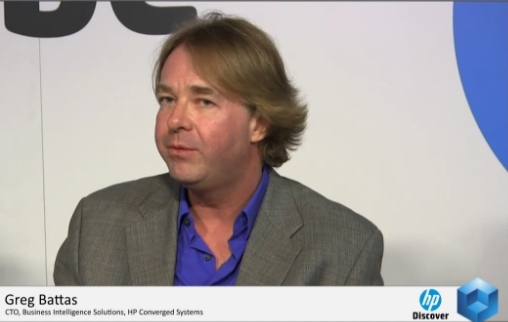 NEWS
NEWS
 NEWS
NEWS
 NEWS
NEWS
![]() Kicking off day 1 of HP Discover 2013 Live in Las Vegas, John Furrier and Jeff Kelly resumed theCUBE’s flagship interviews series with Greg Battas, CTO Business Intelligence Solutions for HP Convergent Systems, to talk about infrastructure as code and the future of software.
Kicking off day 1 of HP Discover 2013 Live in Las Vegas, John Furrier and Jeff Kelly resumed theCUBE’s flagship interviews series with Greg Battas, CTO Business Intelligence Solutions for HP Convergent Systems, to talk about infrastructure as code and the future of software.
Battas begins by talking a bit about the company’s structure, the motivation behind the current organization and converged infrastructure. “Everyone has their own take on organizing a company,” says Battas, “either by product line or by program.”
Converged infrastructure deals with a lot of programs originating in different parts of the company, so pretty soon it became clear there was a needed to get a lot more synergy. This new organization brings everybody under one roof, as one big software development organization.
Six months ago the industry standard was ISS. Now there’s one server organization and this new converge infrastructure team. In a world of firmware and systems programming, there’s this collision between the converged infrastructure team and the apps. That sometimes is hard to achieve in a company the size of HP, even if it doesn’t appear so. It seems that, because there’s plenty of software and hardware folks available, it would be easier to deal with it all, and get anything done. But the sheer size of the company and its personnel makes it hard to get everyone looking in the same direction at the same time.
HP Discover 2013 saw the launch of Project HAVEn, which is HP’s new platform for data analytics. HAVEn leverages HP’s software and hardware, creating analytics solutions compatible with Big Data. In this endeavor, the big challenge was how to make the most of both the software and the hardware. In that respect, Moonshot is such an interesting product. Hailed as “the world’s first software-defined web server”, HP Moonshot intends to accelerate innovation while delivering breakthrough efficiency and scale. Greg Battas explains: “Because cartridges can be so specialized, you have the option to ask yourself now ‘What is the ideal cartridge to do Big Data?'”
A lot of HP’s effort to move forward involves not only bringing the software together, working more closely for the customer, but also figuring out what the optimal hardware configuration is. There is a great deal of diversity, a large variety of uses, and multiple dimensions to deal with. On top of it all, there’s open source.
Speaking about HAVEn, Battas clarified that it is based on Hadoop. He describes Hadoop as more than just a product, comparing it to an ecosystem. It has a lot of components and there are a lot of people adding projects. It plays a central role in Big Data anywhere, and it’s been integrated by HP with what they’re doing in vertical autonomy.
HAVEn involves pre-existing technology that is brought together as a unified platform. The name HAVEn stands for Hadoop, Autonomy, Vertica, Enterprise Security and a large number of other HP offerings. HP Vertica brings really strong structured analysis, HP Autonomy is really good at working with unstructured data, and Hadoop is a landing area for this data.
As HP is moving forward, it’s trying to bring together all of these things, bringing data into the infrastructure, doing structure analysis, making the most of this information wealth. As for open source software, Battas believes it has leaped from the big internet service providers to the mainstream retailers trying to monetize Hadoop capabilities. Manageability is the key factor in this equation.
Reiterating that the Hadoop environment is behaving as an ecosystem, Battas proposed an idea for a potential outcome in the near future. In this ecosystem new projects start everyday, either formally in it, or informally attached to it. A lot of the interesting projects seem to be happening at the edge of Hadoop.
All vendors claim that their product has really unique features, but their products are virtually the same. You can see this in Hadoop. It is open, it is the same, it is community driven, but, in order to make money, vendors need to make their version different. This unique differentiation will always happen.
In terms of long-term success, Greg Battas offered a candid insight on the company’s strategy. In his own words, “HP is one of the few major companies left that truly knows how to partner. We don’t compete with a lot of our partners. Because of that, we have a good relationship with our partners, and that’s one of the things we can leverage here.” HP works with a lot of vendors at different levels and there are hundreds of engineers that work on partner relationships. Engineers, not marketing guys, highlights Battas, because they tune, optimize, make the hardware work, as most of HP’s partners do not have this kind of resources.
Watch the full interview here.
THANK YOU